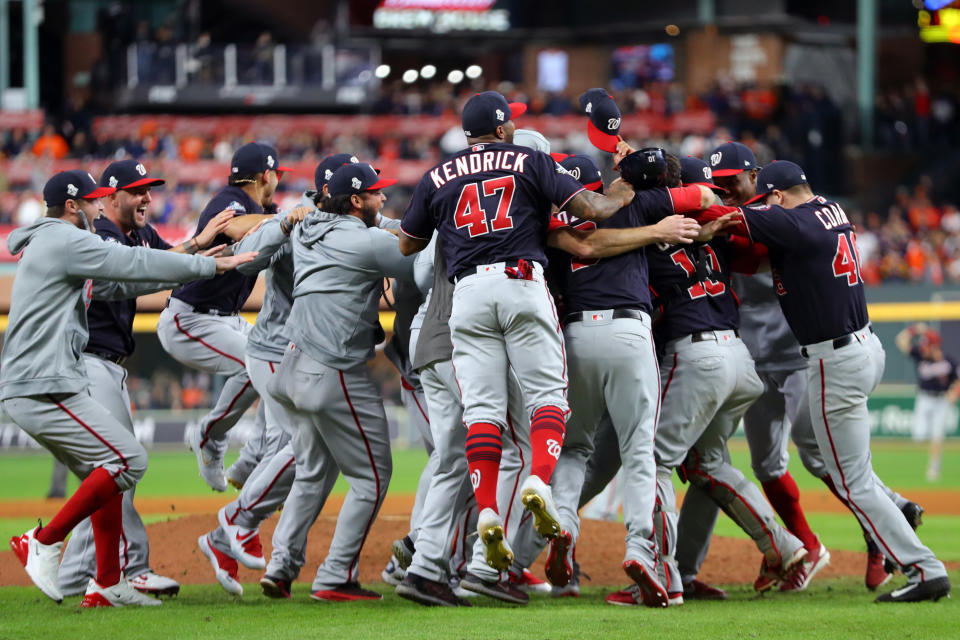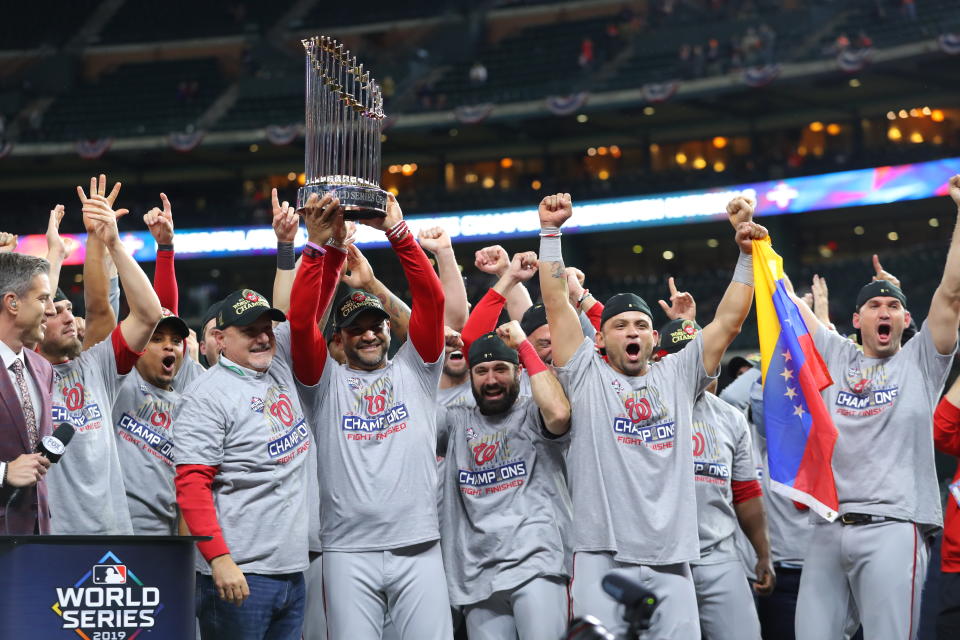How the Nationals stayed in the fight to capture their first World Series title
HOUSTON — There is a point where two baseball teams must give up on proving which is the better of them and settle for which of them can win a baseball game.
For anybody can win a game. Only the special teams will win a championship. Game 7 of the World Series sits somewhere in between.
The Washington Nationals won their championship here Wednesday night and celebrated as such and will be remembered so. The Houston Astros lost a baseball game, one they will mourn for a good time.
In between the two, you could’ve flicked a match stick, but probably not two.
[Championship gear: Get your Washington Nationals World Series title merchandise here]
At the end, their stories were plentiful and their own, some happy and some not, of seven months spent getting here so that they could be the best team, and then of four hours spent deciding who would win the game.
It gets small like that. And smaller still.
Until Max Scherzer is heaving himself through a fourth inning, then a fifth, through 103 pitches, many of which could not be trusted, except they all trusted him. Until Howie Kendrick is finding himself another series to finish, like the division series he all but ended with a grand slam in Los Angeles, and that cut-fastball he hit three weeks later is spinning and carrying and slicing until it reaches the right-field foul pole at Minute Maid Park. Until Daniel Hudson is throwing one last slider that sends most of that ballpark home, and he is stylishly heaving his glove at his oncoming teammates, and what is forgotten in the moment, in their 6-2 victory, in the first championship in franchise history and the first for Washington D.C. in 95 years, is the fact that none of this was supposed to happen. Only that it did.
“In a World Series elimination game,” Hudson said, of which there were two, “it’s just go win. Don’t even worry about who’s better. It’s just a fluky game, a funny game. Anything can happen.”
The glove toss had become a thing he shared with fellow reliever Sean Doolittle, a way to mark the ends of series and, until Wednesday, the beginnings of the next. His glove, this time, came out of his hand high and clean, tumbled to Earth and on a single hop struck the netting in front of his dugout.
“Everybody was running toward me,” he said, “so I had to throw it up in the air. I didn’t want to hit anybody in the face.”

From a 19-31 record in May. From a pitching staff that, by October, was six deep and, by Wednesday night here, counting a starting pitcher who’d slept the night before in a neck brace, maybe 5 1/2 deep. From the departure of franchise player Bryce Harper. From the history of failed postseasons, following a long era of on-again, off-again (and on-again) baseball in their town.
Stephen Strasburg, who won two games in the series, was their MVP. Scherzer, who’d been scratched from his Game 5 start, was their Game 7 starter. Kendrick, at 36, was again the man they had at the plate, leaning a home run fair, two batters after Anthony Rendon had gotten them on their way with a home run.
Struck out in an earlier game by Astros reliever Will Harris, Kendrick had turned in time to see Harris bellow toward his dugout, a slight he carried for days.
“I’ll remember that,” Kendrick announced in the dugout.
Several days later, it was Harris who delivered the cutter that stayed fair by a few feet, that changed the course of the game.
“I told you I’m going to get him!” Kendrick shouted after he’d crossed home plate. “I told you!”
A long time ago, when their season teetered toward irrelevance, they’d had no choice but to go smaller still. They would not reach October without winning a baseball game first. They would not ensure their manager’s job, they would not make something of the season, they would not lighten the boos in their own park, they would not answer the questions of how this could all go so wrong.
So they won a baseball game. And another. And by the time they reached the final Wednesday of October, they had stacked enough of those where it would have seemed a shame not to find one more way to win one more game, even at the expense of the 107-win blue-blood Astros, even on the road, where neither team ever lost.
Afterward, Scherzer, spent from the physical toll and red-eyed from the emotional ride, leaned against a cinder block wall, a beer in his left hand, his soaked gray T-shirt drooping from his shoulders. He’d endured days of treatment, too many injections to count, too many sleepless nights, then delivered whatever he could wring from his right arm. It was five innings. There were 11 baserunners. He gave up two runs. He struck out but three of 26 batters. It was enough. It would have to be.
He later had stood on a stage where they passed around a trophy and shouted into a microphone, from where they could hear red-clad fans shout their names. Off to the side, he wiped his eyes with a paper towel and thought about, he said, “How proud I am of my teammates. Never say die. Stay in the fight. Everything we went through this past month. You can’t describe a better team than we have. What we went through.”
The rest of them, all the fans they’d left behind after losing three games in D.C., they were at Nationals Park, suffering a downpour and watching Game 7 on the scoreboard. Watching their Nationals, cut down for six innings by Zack Greinke, rising up in the seventh.
Then, over eight pitches, the game, the season, changed.
A changeup from Greinke to Rendon, hit into the left-field bleachers.
A five-pitch walk to Juan Soto, by Greinke.
A one-strike cutter from Harris to Kendrick, clanked off the foul-pole screen.
A two-run deficit became a one-run lead. They scored again in the eighth, twice more in the ninth. Patrick Corbin, a regular-season starter turned postseason swingman, got them to the ninth. Hudson got the final three outs.

It was a series that had booed President Donald Trump, that had pressed the Astros for better answers and a truer apology, that had seen bats hauled to first base and one of the haulers — Soto — turn 21. The road team had gone 7-0. There’d been controversy at first base. The series had been shocked by the news that Scherzer could not pitch, then revived by his return, when the series would become very, very small.
Scherzer found himself in the third-base dugout 30 minutes before Game 7, rocking quietly, his hands clasped on his knees, his gaze steady, his knuckles the color of a wedding invitation. At the given time, a clock on the scoreboard or in his head, he leapt to his feet, stomped along the left-field line and arrived in the outfield corner, where he huffed and puffed and warmed his right arm.
Greinke had made four prior starts in the postseason, finished the fifth inning in one of them and, partly as a result, hadn’t won a game. The Astros had won his last two starts, against the New York Yankees and Game 3 in Washington. He emerged from his dugout at about the same time Scherzer did his, though Greinke lacked the same hard mannerisms. He, instead, gazed at parts of the stadium, some tiers full, others getting there, and he appeared bemused.
They would determine the coming hours, those at the end of so many days, almost too many to count.
“Seasons end really fast,” Astros manager A.J. Hinch said.
One does live forever. That it was the Nationals’ season, that it was Davey Martinez who led it, that it was an older roster built in large part through older ideals, that it rose up from such a dark place and that it refused to take a knee ever, speaks to winning a single baseball game. Then doing it again tomorrow.
Wielding a toy lightsaber and his usual wry grin, Doolittle laughed and said, “This is now the most 2019 Nats thing that’s ever happened. It almost felt like it had to be like this.”
More from Yahoo Sports:

